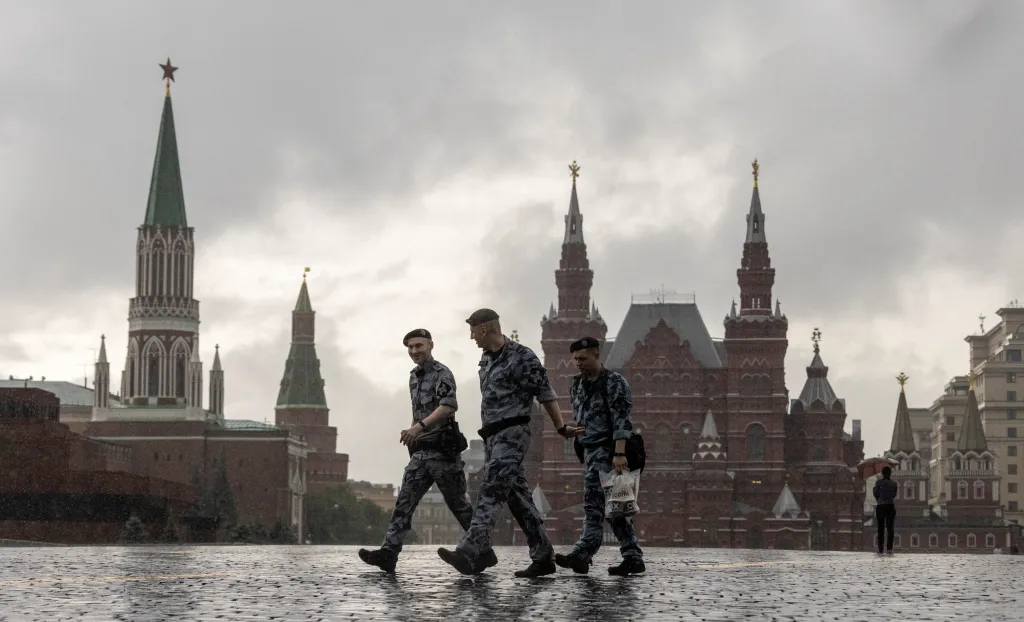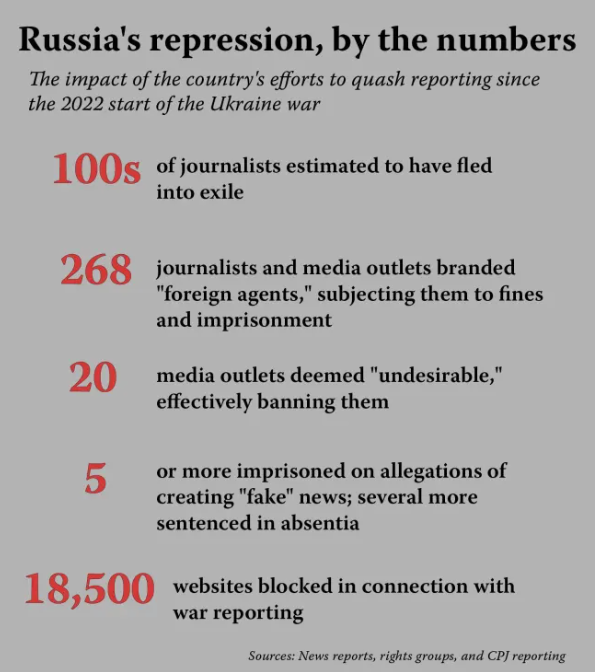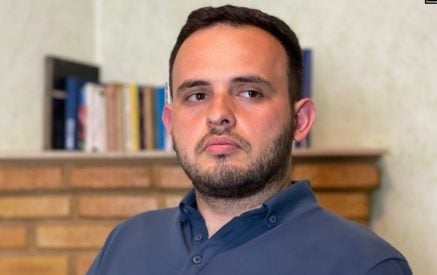By Anna Brakha
Russia’s months-long jailing of journalists Evan Gershkovich and Alsu Kurmasheva —released on August 1 as part of a prisoner exchange — was one of the most blatant illustrations of Russia’s muzzling of the press in the wake of its February 2022 full-scale invasion of Ukraine. The war has precipitated what a representative of the now-shuttered Russian Journalists’ and Media Workers’ Union (JMWU) — speaking anonymously due to security concerns — calls the “biggest press freedom crisis in Russia’s recent history.”
Advocates estimate that hundreds of Russian journalists have fled into exile, where some continue to face transnational repression such as arrest warrants and jail terms in absentia. Those who remain are under heavy scrutiny as independent reporting hangs on by a thread.
Read also
While practicing journalism in Russia has long been difficult, the government has stepped up efforts to quash the work of the media by passing new anti-press laws, amending others, and expanding censorship efforts. “The overall aim, no doubt, if we’re talking about all these tools, of course it’s to muzzle, and they manage to do that, so that people … self-censor,” the JMWU representative told CPJ.
Here are the most common methods Russia has used to silence the press since the war began:
Criminalizing ‘fake news’ about the war
One of the Russian government’s first acts to prevent coverage of the war, in March 2022, was to pass amendments to the criminal code to punish the distribution of “fake news” about the army. At least five journalists are imprisoned for allegedly distributing fake information on the military, one is under house arrest, and several others have been charged in absentia. That includes U.S.-Russian journalist and author Masha Gessen; Russia issued an arrest warrant against Gessen in 2023 for allegedly spreading “fake information” about Russia’s massacre in the Ukrainian city of Bucha in a 2022 interview and sentenced Gessen to eight years in absentia on July 15, 2024. A week later, on July 23, the Russian authorities sentenced Mikhail Zygar, the former editor-in-chief of the now-exiled Russian broadcaster Dozhd TV (TV Rain) and a CPJ 2014 International Press Freedom Awardee, to eight-and-a half years in absentia over an Instagram post about the Bucha massacre.
Russia has used anti-state laws to retaliate against other members of the press, such as the Wall Street Journal’s Evan Gershkovich, convicted on espionage charges, and Russian journalist Ivan Safronov, who is serving a 22-year prison term for treason. Another journalist, Antonina Favorskaya, was charged with participating in an extremist formation after covering the court hearings of late opposition leader Alexey Navalny. Her colleague Artyom Krieger is currently jailed on similar charges.
Expanding ‘foreign agent’ and ‘undesirable’ designations
Russia’s “foreign agent” law, first introduced in 2012 and extended in 2017 to specifically target media outlets and journalists, originally required recipients of foreign funding to apply a “foreign agent” label to any published material and report their own activities and expenses to the government. Initially seen as a badge of honor and opposition by independent news outlets and journalists, the label has become more burdensome during the war. In March 2024, Russia banned advertisements on “foreign agent” outlets, harming the bottom line for many news organizations and YouTube channels. Russia has also made it easier for authorities to impose the “foreign agent” label on individuals and outlets by removing the requirement that the Ministry of Justice prove foreign funding in July 2022.
Wall Street Journal reporter Evan Gershkovich stood trial on spying charges at this court building in Yekaterinburg, Russia, shown here on July 19, 2024. (Photo: Reuters/Dmitry Chasovitin)
According to Dmitrii Anisimov, a spokesperson and campaigner for the human rights news website OVD-Info, as of July 2024, some 268 journalists and media outlets were labeled as “foreign agents” in the country. With the Ukraine war, journalists have been increasingly fined for failing to list their status or submit the required reports, and some even face imprisonment. Prior to her release, Kurmasheva, a U.S.-Russian journalist and an editor for U.S. Congress-funded Radio Free Europe/Radio Liberty, was detained for more than nine months after being accused of failing to register as a “foreign agent” and later sentenced to 6-and-a-half years on charges of spreading “fake” news about the Russian army. Denis Kamalyagin, a Russian journalist in exile, is facing two years in jail for not complying with the law, he told CPJ.
Since the war, Russia has also been increasingly applying another label—“undesirable” —to media outlets. Widely considered an escalation of the “foreign agent” label, the “undesirable” label was first introduced in 2015 to effectively ban organizations registered abroad from operating in the country. Working for an “undesirable” organization can carry a six-year prison sentence and administrative fines. It’s also a crime to distribute content from an “undesirable” organization or donate to it from inside or outside Russia.
Before the war, the investigative site Proekt was the only media outlet deemed “undesirable,” but as of July 2024, 20 have been slapped with the label, according to Anisimov. Between January and June 2024, Russian authorities opened at least 28 media-related cases against individuals for “participation in an undesirable organization,” according to Alexander Borodikhin, a data reporter with independent news outlet Mediazona. Borodikhin told CPJ that of the 28 cases, 12 are against journalists, 14 are against people who reposted “undesirable” content, and two are against journalistic sources.
Maria Epifanova, CEO of Latvia-based Novaya Gazeta Europe, which was deemed “undesirable” in June 2023, told CPJ that the label impacted the outlet’s work and finances. Freelancers in Russia “have to work in fear, write under pseudonyms,” she said. Anyone who talks to the outlet is also at risk. “We have to hide the names and details that help identify a person. That dramatically influences the credibility of articles,” Epifanova said.
Some outlets can’t survive the designation. HelpDesk media was launched shortly before the full-scale invasion “to show the war in Ukraine through the eyes of ordinary people,” according to the website. On May 20, less than five months after being labeled “undesirable,” it announced its closure, saying it did not have enough funds to keep operating.
Revoking media licenses and blocking websites
Some Russian outlets are in danger of losing their government-issued licenses over coverage, particularly since Russia passed a July 2022 law allowing authorities to invalidate the registration of media outlets without a court order. According to the Mass Media Defense Center, a Russian group that provides legal aid to journalists and news outlets, as well as other journalists CPJ spoke with, registration has many benefits, including faster responses to requests for comment from officials and eligibility for accreditation to cover official functions.
Leading Russian independent news site Novaya Gazeta — not to be confused with Novaya Gazeta Europe, made up of ex-employees of the former who fled the country — had both its print and online licenses canceled in September 2022. Nadezhda Prusenkova, the head of the outlet’s press department, told CPJ that the outlet is in survival mode. “No circulation, no advertising, just crowdfunding and [an] online shop. No salary for journalists. No possibility to work officially [from places that require accreditation].”
Some outlets have their content blocked online before they lose their license. Mark Nebesnyi, the editor-in-chief of independent news outlet Svobodnye Media, told CPJ that the Russian state media regulator, Roskomnadzor, blocked its website shortly after the start of the full-scale invasion without any explanation. He believes the blocking was in retaliation for the outlet’s critical reporting on the war, the Russian government, and the outlet’s investigations into alleged embezzlement of the state budget. After the blocking, which he said caused a significant economic blow, Svobodnye Media lost its license in October 2023.
Journalists gather at Russia’s Supreme Court during a hearing of a case to revoke the registration of the independent Russian newspaper Novaya Gazeta’s website on September 15, 2022. (Photo: Reuters/Evgenia Novozhenina)
According to Russian independent internet freedom group Roskomsvoboda, more than 18,500 websites had been blocked in connection with their reporting on the war as of May 2024. Many websites pull down their own content in fear of retaliation, Roskomsvoboda reported last year.
Foreign journalists and their outlets have also faced arbitrary and repressive measures. Several members of the foreign press were forced to leave following the withdrawal of their accreditation or the denial of their visa renewals. In late June, the Russian Ministry of Foreign Affairs announced that access to 81 European media outlets would be blocked because they spread “false information” about the war.
“[In Russia], independent journalism is still possible. But that’s the problem. You never know how long you’re going to exist and what you’re risking,” the JMWU representative said.
CPJ emailed the Russian investigative committee, the Russian prosecutor general’s office, and media regulator Roskomnadzor for comment on measures against the press, but did not receive any reply.
Anna Brakha joined CPJ as a Europe and Central Asia researcher in 2022. Prior to CPJ, she worked in different structures at the crossroads of media and international relations. She holds a master’s degree in international relations and post-Soviet studies from INALCO University and a Master of Science of Management and Media and Digital industries from ESSEC Business School. She speaks French and Russian.
Committee to Protect Journalists



























































